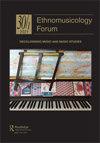‘You are part of the club’: negotiating the field as a musician–ethnomusicologist
IF 0.5
1区 艺术学
0 MUSIC
引用次数: 1
Abstract
ABSTRACT This article explores the position of ethnomusicologists approaching the field with the prior lived experience of being a working/proficient musician, meeting other fellow musicians in all the complexity of each person’s multi-layered background. Within these layers, musical practice and the experience of musicking are central to the relationships created between these individuals. The various case studies put forward in the paper bring to the fore how proficient musician-researchers have used their musical skills to negotiate fieldwork, integrating it as a central part of their process. Musical ability, central to their identity as an individual, becomes an additional layer that has arguably enabled musician-ethnomusicologists to access communities on a level where the latter are able to actively work with them, assigning them roles that can satisfy both parties and lead to what is presented as ‘applied relationships’. The article makes the case that the musician-ethnomusicologist’s creative practice, while not directly leading to REF outputs and therefore remaining an unspoken activity, is intricately entwined with their research activity.“你是俱乐部的一员”:作为一名音乐家——民族音乐学家,在这个领域进行谈判
本文探讨了民族音乐学家在接近该领域时所处的地位,他们之前是一名工作/熟练的音乐家,在每个人多层次背景的复杂性中与其他音乐家同行会面。在这些层次中,音乐实践和音乐体验是这些个体之间建立关系的核心。论文中提出的各种案例研究突出了熟练的音乐家研究人员如何利用他们的音乐技能来进行田野调查,并将其作为他们过程的核心部分。音乐能力是他们作为个体身份的核心,它成为一个额外的层面,使音乐家-民族音乐学家能够在一个层次上接触社区,后者能够积极地与他们合作,为他们分配能够满足双方的角色,并导致所谓的“应用关系”。这篇文章表明,音乐家-民族音乐学家的创造性实践,虽然没有直接导致REF输出,因此仍然是一种未言明的活动,但与他们的研究活动错综复杂地交织在一起。
本文章由计算机程序翻译,如有差异,请以英文原文为准。
求助全文
约1分钟内获得全文
求助全文
来源期刊

Ethnomusicology Forum
MUSIC-
CiteScore
1.10
自引率
25.00%
发文量
29
期刊介绍:
Articles often emphasise first-hand, sustained engagement with people as music makers, taking the form of ethnographic writing following one or more periods of fieldwork. Typically, ethnographies aim for a broad assessment of the processes and contexts through and within which music is imagined, discussed and made. Ethnography may be synthesised with a variety of analytical, historical and other methodologies, often entering into dialogue with other disciplinary areas such as music psychology, music education, historical musicology, performance studies, critical theory, dance, folklore and linguistics. The field is therefore characterised by its breadth in theory and method, its interdisciplinary nature and its global perspective.
 求助内容:
求助内容: 应助结果提醒方式:
应助结果提醒方式:


